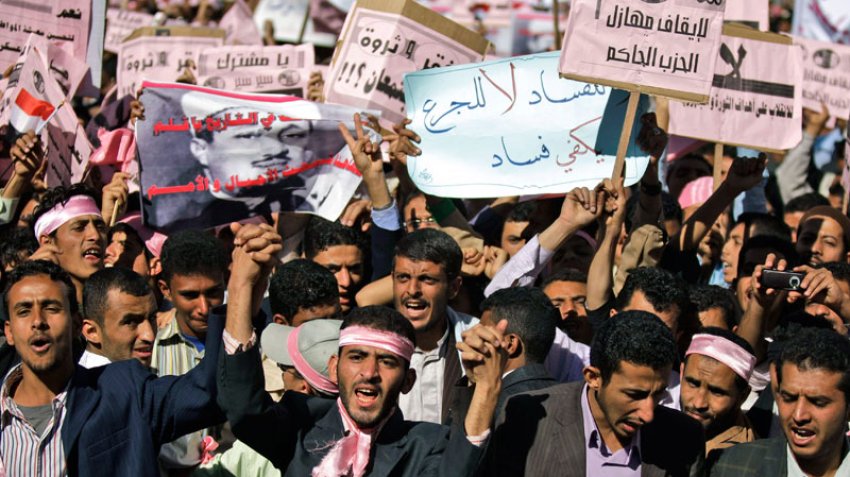
AlJazeera.net reported on January 29 that new protests had erupted in the Middle Eastern nation of Yemen, which sits at the bottom of the Arab peninnsular, demanding an end to the regime of President Ali Abdullah Saleh.
The site reported on January 28 that thousands had also taken to the streets in anti-government protests in Jordan, with people angry over price rises and unemployment.
On January 29, AlJazeera.net wrote on Yemen:
Dozens of activists calling for the ouster of Ali Abdullah Saleh, Yemen's president, have clashed with government supporters in Sanaa, the country's capital.
Plainclothes police also attacked the demonstrators, who marched to the Egyptian embassy in Sanaa on Saturday chanting "Ali, leave leave" and "Tunisia left, Egypt after it and Yemen in the coming future".
The chants were referring to the ouster of Zine El Abidine Ben Ali in Tunisia early this month and to continuing demonstrations against Hosni Mubarak, the president of Egypt.
No casualties have been reported in the Yemen clashes.
Tawakel Karman, a female activist who has led several protests in Sanaa during the past week, said that a member of the security forces in civilian clothes tried to attack her with a dagger and a shoe but was stopped by other protesters.
"We will continue until the fall of Ali Abdullah Saleh's regime," said Karman, who was granted parole on Monday after being held over her role in earlier protests calling for political change in Yemen.
"We have the Southern Movement in the south, the (Shia) Huthi rebels in the north, and parliamentary opposition," all of which are calling for political change, Karman said.
Yemen, one of the poorest countries in the Arab world, faces a growing al-Qaeda threat, a separatist movement in the south and a sporadic rebellion by Zaidi Shia rebels in the north.
"But what's most important now is the jasmine revolution," Karman said, who is also a senior member of the opposition Islamist Al-Islah (Reform) party and heads a rights group, Women Journalists Without Chains.
Karman also called for Thursday, February 3 to be a "Day of rage" throughout Yemen.
Protests have been taking place on a nearly daily basis in Sanaa since mid-January calling for an end to Saleh's rule which began in 1978. Saleh was re-elected in September 2006 for a seven-year mandate.
A draft amendment of the constitution, under discussion in parliament despite opposition protests, could allow him - if passed - to remain in office for life.
Saleh had urged the opposition which rejected the amendment, to take part in April 27 parliamentary elections to avoid "political suicide."
The mandate of the current parliament was extended by two years to April under a February 2009 agreement between the ruling General People's Congress and opposition parties to allow dialogue on political reform.
The reforms on the table included a shift from a presidential regime to a proportional representation parliamentary system and further decentralisation of government - measures that have not been implemented.
A January 27 Al Jazeera report on Yeman.
On January 28, AlJazeera.net wrote about the Jordan protests:
Thousands of people in Jordan have taken to the streets in protests, demanding the country's prime minister step down, and the government curb rising prices, inflation and unemployment.
In the third consecutive Friday of protests, about 3,500 opposition activists from Jordan's main Islamist opposition group, trade unions and leftist organisations gathered in the capital, waving colourful banners reading: "Send the corrupt guys to court".
The crowd denounced Samir Rifai's, the prime minister, and his unpopular policies.
Many shouted: "Rifai go away, prices are on fire and so are the Jordanians.''
Another 2,500 people also took to the streets in six other cities across the country after the noon prayers. Those protests also called for Rifai's ouster.
Members of the Islamic Action Front, the political wing of the Muslim Brotherhood and Jordan's largest opposition party, swelled the ranks of the demonstrators, massing outside the al-Husseini mosque in Amman and filling the downtown streets with their prayer lines.
King Abdullah has promised some reforms, particularly on a controversial election law. But many believe it is unlikely he will bow to demands for the election of the prime minister and Cabinet officials, traditionally appointed by the king.
Rifai also announced a $550 million package of new subsidies in the last two weeks for fuel and staple products like rice, sugar, livestock and liquefied gas used for heating and cooking. It also includes a raise for civil servants and security personnel.
Record deficit
However, Jordan's economy continues to struggle, weighed down by a record deficit of $2bn this year.
Inflation has also risen by 1.5 per cent to 6.1 per cent just last month, unemployment and poverty are rampant - estimated at 12 and 25 per cent respectively.
Ibrahim Alloush, a university professor, told the Associated Press that it was not a question of changing faces or replacing one prime minister with another.
"We're demanding changes on how the country is now run," he said.
He also accused the government of impoverishing the working class with regressive tax codes which forced the poor to pay a higher proportion of their income as tax.
He also accused parliament as serving as a "rubber stamp'' to the executive branch.
"This is what has led people to protest in the streets because they don't have venues for venting how they feel through legal means," Alloush said.